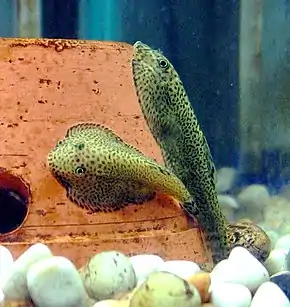Gastromyzontidae
Les Gastromyzontidae[1] ou « loches de rivière » sont une famille de poissons de l’ordre des Cypriniformes. Les Gastromyzontidae sont une famille de loches indigènes à la Chine et l'Asie du Sud. Ils se rencontrent généralement dans les ruisseaux et les rivières avec un courant rapide. La famille comprend environ 137 espèces répartie dans dix-huit genres. Cette famille a été ressuscitée par M. Kottelat dans son examen et la révision des loches en 2012[1].
Gastromyzontidae

Gastromyzon fasciatus
Liste des genres
Selon FishBase (09 juillet 2015)[2]:
- Famille non encore reconnu par FishBase.
Note
Selon M. Kottelat, (2012)[1]:
- Annamia Hora, 1932
- Beaufortia Hora, 1932
- Erromyzon Kottelat, 2004
- Formosania Ōshima, 1919
- Gastromyzon Günther, 1874
- Glaniopsis Boulenger, 1899
- Hypergastromyzon T. R. Roberts, 1989
- Katibasia Kottelat, 2004
- Liniparhomaloptera P. W. Fang, 1935
- Neogastromyzon Popta, 1905
- Paraprotomyzon Pellegrin & P. W. Fang, 1935
- Parhomaloptera Vaillant, 1902
- Plesiomyzon C. Y. Zheng & Yi-Yu Chen, 1980
- Protomyzon Hora, 1932
- Pseudogastromyzon Nichols, 1925
- Sewellia Hora, 1932
- Vanmanenia Hora, 1932
- Yaoshania Jian Yang, Kottelat, J. X. Yang & X. Y. Chen, 2012[3]
Galerie

 Beaufortia leveretti
Beaufortia leveretti Plesiomyzon baotingensis
Plesiomyzon baotingensis Sewellia lineolata
Sewellia lineolata
Notes et références
- Kottelat, M. (2012): Conspectus cobitidum: an inventory of the loaches of the world (Teleostei: Cypriniformes: Cobitoidei). The Raffles Bulletin of Zoology, Suppl. No. 26: 1-199.
- FishBase, consulté le 09 juillet 2015
- Yang, J., Kottelat, M., Yang, J.-X. & Chen, X.-Y. (2012): Yaoshania and Erromyzon kalotaenia, a new genus and a new species of balitorid loaches from Guangxi, China (Teleostei: Cypriniformes). Zootaxa, 3586: 173–186.
Liens externes
- (fr+en) Référence FishBase : () ()
- (en) Référence Animal Diversity Web : Gastromyzontidae
- Portail de l’aquariophilie
- Portail de l’ichtyologie
Cet article est issu de Wikipedia. Le texte est sous licence Creative Commons - Attribution - Partage dans les Mêmes. Des conditions supplémentaires peuvent s'appliquer aux fichiers multimédias.